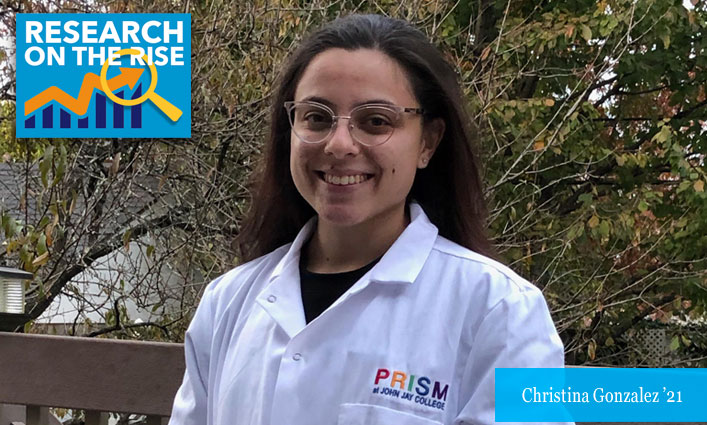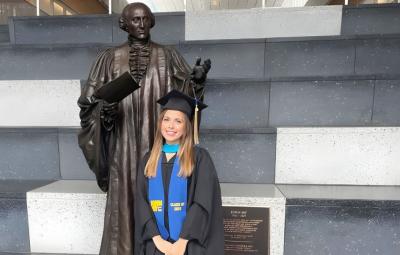
Christina Gonzalez ’21 Wins Society for the Advancement of Chicanos/Hispanics and Native Americans in Science Award for Breast Cancer Research
Research sits at the core of our mission to educate for justice,” says President Karol V. Mason. The remarkable research that our esteemed faculty, students, and alumni perform directly impacts our society and helps move the needle forward toward creating a more just world. Their empirical data reveals inconsistencies, pushes boundaries, and opens minds to a whole new way of thinking. Our “Research on the Rise” series aims to showcase the ongoing, upcoming, and noteworthy research happening right here at John Jay.
Christina Gonzalez ’21, a Cell and Molecular Biology major from Long Island, New York, has always been fascinated by scientific research. “When I was a teenager, one of my absolute favorite gifts was actually a microscope,” says Gonzalez, a Program for Research Initiatives in Science and Math (PRISM) student. Throughout her journey at John Jay College, Gonzalez has put that love of science to good use. Recently, she was awarded the Society for the Advancement of Chicanos/Hispanics and Native Americans in Science (SACNAS) Undergraduate Presentation Award for using a bioinformatics approach while examining the interactions between green tea catechins (compounds) and microRNA molecules in breast carcinogenesis. This research, done with Lissette Delgado-Cruzata, Ph.D., Assistant Professor of Molecular Biology, is actually Gonzalez’s second impressive award involving breast cancer research. Last year she was awarded the Annual Biomedical Research Conference for Minority Students (ABRCMS) Cancer Biology Presentation Award.
“I want to show minority women that they can be involved in medicine and scientific research. I want to help the public regain trust in medicine and our healthcare industry.” —Christina Gonzalez
“Right now, I’m really leaning toward going to med school because there’s a lack of trust in healthcare, especially in communities of color. Thinking of how people of color have been treated historically by the medical community, I understand it,” says Gonzalez, who is considering applying to medical school after her December 2021 John Jay graduation. “I want to show other minority women that they can be involved in medicine and scientific research. I want to help the public regain trust in medicine and our healthcare industry, especially people of color.” We sat down with Gonzalez to learn more about her research and aspirations for the future.
Transferring to John Jay
As a woman who identifies as Puerto Rican, Cuban, and Spanish, Gonzalez intensely felt the lack of diversity at the other universities she attended before John Jay College. “I just didn’t feel represented at those schools. When I was looking to transfer to new college, the representation of minorities played a really big factor for me—in fact it was one of the main factors I looked into,” she says. “Then I spoke with the admissions team. They were just really nice and it was really apparent that they cared about the students here. When the admissions team told me about the newly founded Cell and Molecular Biology program, I was sold, John Jay was my school.”
“When the admissions team told me about the newly founded Cell and Molecular Biology program, I was sold, John Jay was my school.” —Christina Gonzalez
Finding Scientific Mentors
A year after transferring to John Jay, Gonzalez started conducting research with Delgado-Cruzata and met other amazing women in the department doing scientific research, including Associate Professor Angelique Corthals, Ph.D. and Professor Elise Champeil, Ph.D. “I met Dr. Delgado-Cruzata through PRISM and got really excited about the research she was doing on breast cancer. I enjoy the work and it’s even more meaningful to me because we’re looking at breast cancer in minority women,” she says. “Most people know what DNA is, that double helix chain that carries genetic instructions in your body. RNA is what makes the proteins in your body and that’s what gives you your eye color, your hair color, and all of your characteristics. It basically makes you who you are. In my research with Dr. Delgado-Cruzata, we’re looking at microRNA and three specific compounds in green tea called catechins. We’re looking at the interactions between the catechins and the microRNA in breast cancer cells. The reason why we’re looking at this is because breast cancer microRNA levels are deregulated, so with the right interaction, they could be more expressed or they could be lower expressed.” The team hopes to use the catechins to restore normal microRNA levels while preventing and suppressing cancer cells from growing.
Presenting Her Research
The judges at SACNAS reviewed the work of thousands of undergraduate presenters. Fortunately, after hearing the passion behind the work that Gonzalez was conducting with a team of professors and other students, they chose her presentation as one of the best. “The presentation was done virtually, so I was at home, super nervous. About 10 minutes before I had to present to the judges, my allergies started acting up,” she says with a laugh. “At first I freaked out, then I remembered how my mentors told me to stay calm. I told myself I could do it, and I pushed through.” Gonzalez methodically went through the team’s two-step approach—using both computer software to predict the interactions and then actual lab work to see the interactions in action. “It was never just my work or me, there were so many other people involved in the research. While I was giving my presentation, I kept thinking about them and I didn’t want to let any of them down.”
“I want other women of color to see what I’m doing and know that they can become doctors and have successful research careers.” —Christina Gonzalez
Focusing on Her Future
As the end of her undergraduate career came nearer, Gonzalez felt torn between two possible scientific futures—one involving research, the other involving medical school and working with patients. “Throughout the pandemic, Dr. Corthals was researching Covid-19 and actually made a documentary about it,” she says. “That really inspired me because she’s doing what I want to do in the future. I love the idea of researching viruses, and studying pathology would allow me to do that and make vaccines.” Remembering back to what it felt like being in an environment with very few people of color, and acknowledging that our country needs more Latinx and Black doctors, Gonzalez plans to take a gap year off to study for the Medical College Admission Test, and then apply to medical school. “It’s very important for people of color—especially women of color—to be in science, because we’re already so underrepresented. I would love to become a doctor in the future and help women everywhere find their voice in the healthcare industry. I want other women of color to see what I’m doing and know that they can become doctors and have successful research careers.”



